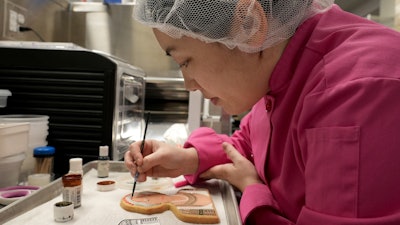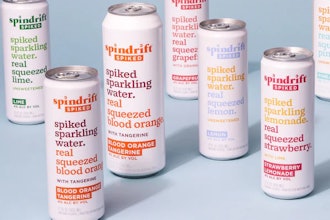
Artist Jasmine Cho makes exquisite portraits that champion famous and forgotten Asian Americans. Her canvas?
"Cookies, I've always said, are the perfect platform for education, activism and healing because they are one of the most disarming, inviting and surprising mediums," said Cho, who is also a baker.
She believes her art comes in part from a sense of not belonging that she felt growing up. May is Asian American and Pacific Islander Heritage Month, but Cho's cookies bring attention to AAPIs every month.
The Korean American self-described "cookie activist" has gained fans over the last several years for her finely detailed cookie faces. Actors Awkwafina, Daniel Dae Kim and Tamlyn Tomita are among those who've gushed about receiving the cookie treatment.
The city of Pittsburgh, where she has lived since 2009, even issued a "Jasmine Cho Day" proclamation in 2020.
In 2016, Cho was contentedly making cute character cookies for her online bakery, Yummyholic, when she turned flour, sugar, butter and other ingredients into cookie likenesses of a friend for a birthday party. The cookies quickly grabbed social media attention. Others wanted them done too.
"I suddenly have this platform or this medium that everyone is paying attention to," Cho said. "It felt like a sort of superpower."
She had an "aha moment" of how to use her great power with greater responsibility.
The 39-year-old, who grew up in Southern California and New Mexico, always took notice when Asian Americans and Pacific Islanders weren't present in a movie, TV show or history book. It contributed to her questioning her own sense of belonging in America.
"That was always a pain point for me growing up," said Cho, who recently completed a master's degree in art therapy. "So, I kind of always had this question: 'I wonder if I could use this point of joy for me to address this pain point?' And cookies was the answer."
A few months after making those first cookie faces, Cho held her first portrait gallery show. She made cookies of Asian American Pittsburgh natives like actor Ming-Na Wen and Leah Lizarondo, the founder of 412 Food Rescue, which decreases food waste in over 25 cities in the U.S. and Canada by distributing unsold food to people in need.
 Jasmine Cho holds a cookie portrait of the late Hawaii Rep. Patsy Takemoto Mink, the first Asian-American woman to serve in Congress.AP Photo/Matt Freed
Jasmine Cho holds a cookie portrait of the late Hawaii Rep. Patsy Takemoto Mink, the first Asian-American woman to serve in Congress.AP Photo/Matt Freed
"I shared it as widely as I could as I was so proud to be among the people she did cookie portraits of," Lizarondo said by email.
While cookies and cake tributes might come off as silly, Lizarondo saw something different in Cho's art.
"It is such an accessible way to catalyze conversation," said Lizarondo.
A one-woman crew, Cho needs between four and six hours for one portrait. She draws the cookie face by hand, fills it in with icing and then lets it dry.
Her "art-ivism" has taken her interesting places. In 2019, she wrote and illustrated a children's book, "Role Models Who Look Like Me." In the last few years, she has made over 20 virtual and in-person appearances at universities, elementary schools and conferences. If she isn't giving a speech, she's leading a cookie-decorating workshop.
The biggest thrill is when young Asian Americans, particularly females, feel inspired.
"They tell me things like, 'I learned more in your 15-minute talk than I have in my whole class that's about Asian American history,' or something like that," Cho said.
At a time when demanding to see Asian American history included in school curricula can get you branded as "woke," even Cho's seemingly innocuous cookies can be a target. Ahead of a university visit last February, someone Cho thought was a student journalist asked to talk to her. Cho later learned that person wasn't a student but part of a far-right group. The school decided to increase security for the event — something that stunned her.
"It's just cookies," Cho said. "But, not to diminish the intent of what I'm actually using the cookies to do... Unfortunately, even something like cookies could be seen as a threat because of what they symbolize."
They're definitely not just cookies. They can evoke poignant moments.
Cho made a cookie portrait of Betty Ong, an American Airlines flight attendant who died on 9/11. Ong was credited as the first person to raise the alarm about the terrorists' hijacking, passing along crucial information from a phone on the ill-fated plane. One of her nieces spotted Cho's creation on Instagram and contacted her.
"For a family member to reach out and just thank me for sharing her story in the way that I did ... reminding me of the tenderness that comes with this work, the importance of it," Cho said. "I don't ever want to upset a family member in any way. I've been very grateful that those who I have heard from understand my intention."
Cho estimates she has between 50 and 70 of the cookie portraits now boxed up in storage. Some she dreams of giving to the subject ( Michelle Yeoh, if you're reading this.). Others she would love to display, as well as publish a picture book of them.
Even with praise from families, celebrities and Instagram, Cho still has moments when she can be dismissive of her own work. "I'll be like, 'I'm just making cookies. What am I really doing?'"
But then she feels re-energized when encountering audiences who have never heard of figures like civil rights activist Grace Lee Boggs or diver Sammy Lee, the first Asian American man to earn Olympic gold.
"Part of what keeps me going is one day, I do hope that my work maybe becomes irrelevant because everyone has access to this history and awareness of it."






















